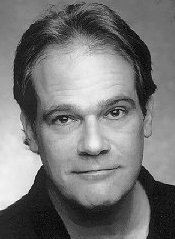 |
Jeffrey Spolan's Thoughts On Jerzy Grotowski |
 |
Jeffrey Spolan's Thoughts On Jerzy Grotowski |
| Editor(Owen Daly)>
Jeff got an email asking questions about
the great Polish Theatre director Jerzy Grotowski. Perhaps a fellow
actor or director was looking for insight into a form of theatre that
Jeff had devoted several years of his life to? As Webmeister,
I was curious. I went out to a web search engine and searched
on just 'Grotowski' . An old page on his web site with a quip
about Grotowski was the sixth hit. A small group of actors
directed by Dr. Jacques Burdick spent over three years recreating and
exploring Grotowski's ideas and techniques from 1968 to 1970. Pillory Theater created three major and several minor
works, performing in the Northeast United States, and at Il Miedzynarodowy
Festiwal Festiwali Teatrow Studenckich in Grotowski's Wroclaw,
Poland. Additional source material is listed on the Grotowski
Directory page. Question> In the writings of Grotowski how important is the actor in the theatre? Jeffrey Spolan> Sine qua non. I was trained for three years using his techniques almost exclusively. My experience was profound. You can think of the "text" as the skeleton. It's about archetype and how one can reach that A point overlooked is that he came from an Eastern European {Not a prerequisite for doing the work of learning but rather Without trying to sound too full of hubris on my part His audience came to the theater with a shared tradition of {Please note: I am neither Polish in my heritage nor Catholic.} No such shared tradition/foundation exists in the mass i.e. the soil is pretty thin. The roots didn't take very deeply here... for many reasons. But did cause a sensation... "This year Grotowski.. next year Zen." He knew we were a culture of "fads" and his time or as we put it: ... he had his 15 minutes. He knew that. That is what is beneath the quip about his work on my web page. Those who know, know. (Which will take you
to a very interesting question: (which is actually very Greek) and that is what my quip about "onions" is all about.) The notion of Poor Theatre was not something Witness the plague of Attention Disorder Syndrome Sorry. This stuff ain't easy. Q.> In terms of their presence, what the body is doing , how it influences representation? J.S.> During the rehearsal process - and I'm not speaking of The "it" is then shaped by the director. **************************************************** It's fair to say sometimes the body becomes the theater. I will give you an example. I witnessed a performance of Grotowski's company An actress stood in a corner and began to sing What happened next was I had the sense of Her "song" was being heard through my back! The effect was made even more so because The "child" was not a "child" but rather Get my meaning? It didn't matter that almost no one in the audience Her technique was such that the depth of her Sounds impossible right? WRONG ! It can be done... I will add one thing. You could make the point that because I had When the play was over I discovered These were not cheap theatrical tricks he was Nevertheless... it's how they are used.
We will now entertain
questions about Gun Control....
Q> Thank-you so much for the info on Grotowski. I really appreciate it. Have an essay due on Monday!! JS> Glad to help. Kick some butt! Like any good artist G. allowed himself to be influenced by many sources and then came up with his own way of doing things. The "work" in his theater was essentially non-verbal. There had to be what we would call "trust" or "confidence" between the participants. Otherwise "it" won't work. An actor pursuing this line of development has to be
willing to face some very In other words: one needs guts and grit and no shit. I once heard Christopher Walken remark: "Actors will steal anything." (that works) Then again, there is the Disney cartoon of the
"Sorcerer's Apprentice" {non verbally and cartoon-like} Among them: "Now that I've got it, what do I do with it?"
|
Pages by owendaly.com